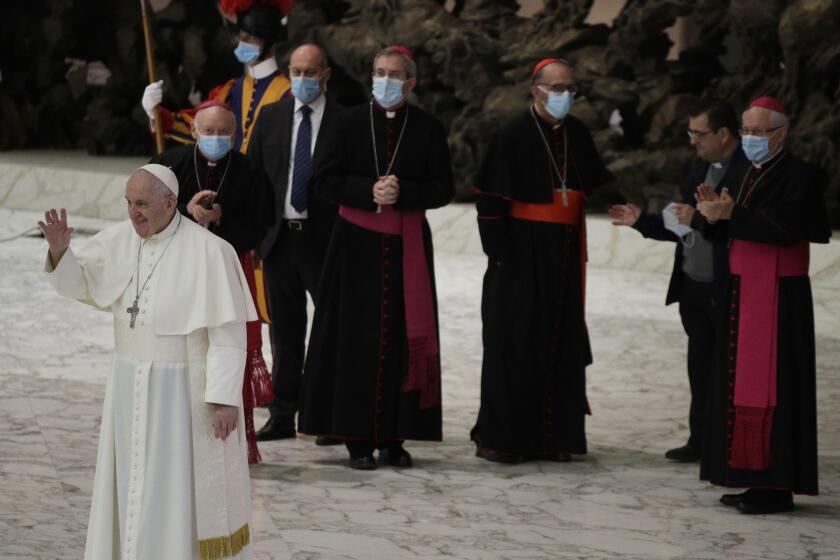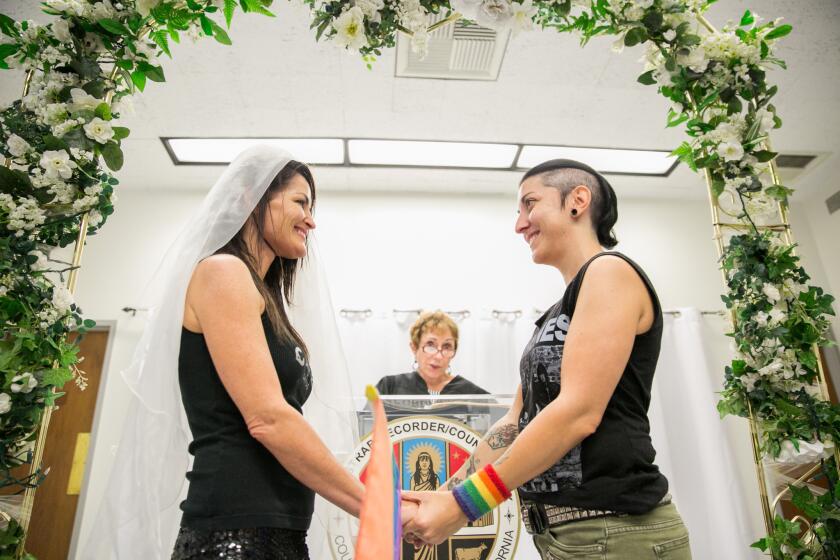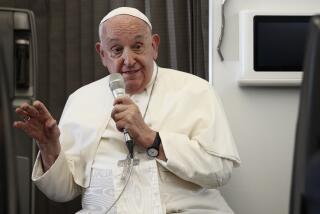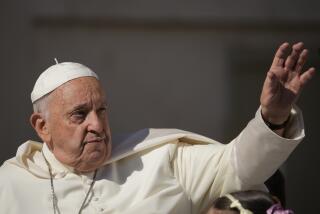Angelenos applaud pope’s endorsement of same-sex civil unions but worry it doesn’t go far enough
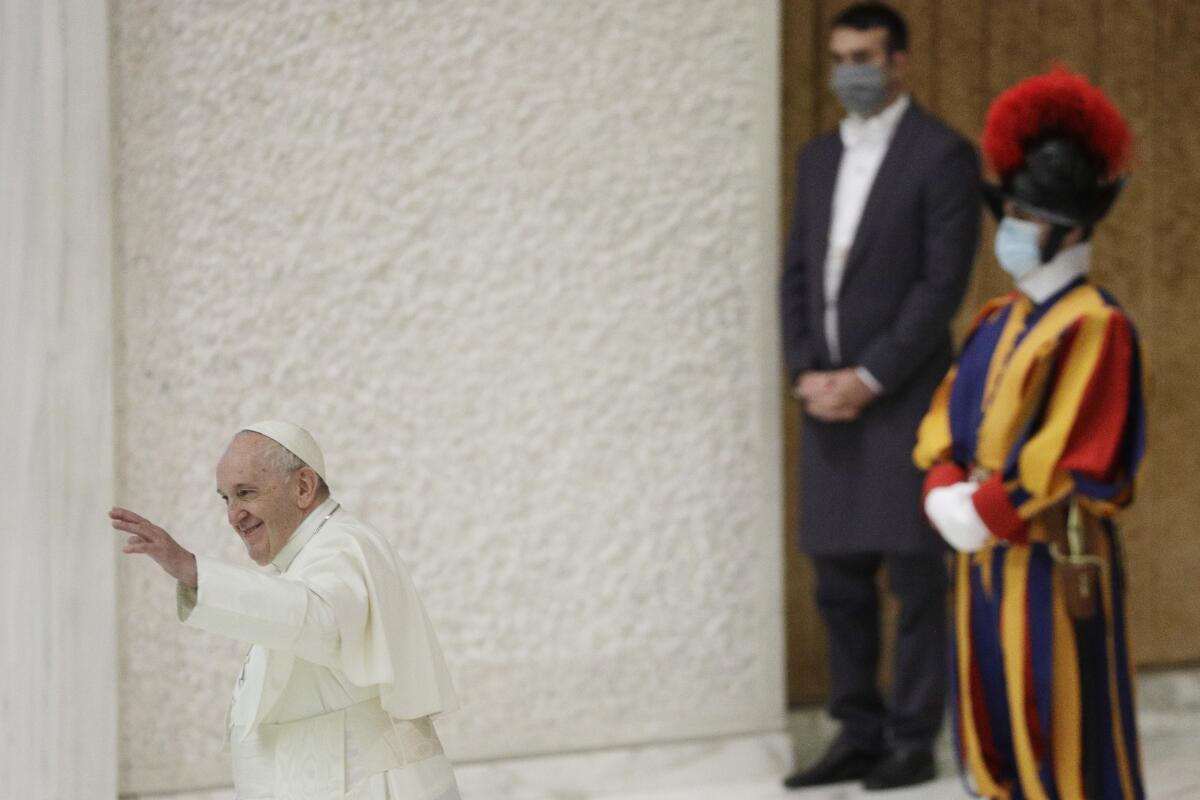
Jesus Suatan first heard about Pope Francis’ groundbreaking comment supporting same-sex civil unions from a friend’s excited phone call Wednesday.
“It’s a party for all of us. We’ve been validated by the pope!” Suatan recalled his friend raving. “He’s given us the consent!”
As a lifelong practicing Catholic, Suatan said the news made him feel “safer” about going to church. The census outreach organizer for the Boyle Heights-based Latino Equality Alliance said he sometimes wears skirts and other women’s clothing to church, eliciting gawks and stares from other parishioners.
Dressing “pretty flamboyantly” as a masculine-presenting person for Mass was a way of protesting the Church’s entrenched traditions that made him feel like “a bad person” as a child, Suatan said. He greets people’s stares with a smile and a “hello.”
“I’m not going to entertain arguments or ... feel that I have to prove myself to anybody because at the end of the day, God is the only person I have to prove myself to,” Suatan said. “I hope [the pope’s comment] opens up the views and opinions of other Catholics, especially coming from the super top of the top, the crème de la crème!”
In a documentary released Wednesday, Pope Francis endorsed same-sex civil unions. Previously, as archbishop in Argentina, he supported civil unions as an alternative to same-sex marriages.
“Homosexual people have the right to be in a family. They are children of God,” Francis says in the film. “You can’t kick someone out of a family, nor make their life miserable for this. What we have to have is a civil union law; that way, they are legally covered.”
‘Homosexual people have the right to be in a family. They are children of God,’ Pope Francis says in departure from previous pontiffs but in keeping with his own more tolerant views.
His comments sparked reactions across the globe as people grappled with the idea of an increasingly accepting head of the Catholic Church. The pope previously made headlines in 2013, when he said, “If someone is gay and he searches for the Lord and has goodwill, who am I to judge?”
Still, for some Angelenos, Francis’ comments don’t go far enough.
Phoenix, who uses the gender-neutral pronoun they and declined to give a last name, initially felt a spark of excitement after hearing the news. As a Los Angeles-based sex educator with a focus on LGBTQ communities, Phoenix often has worked with clients dealing with “religious shame.” For those people, the pope’s comments offered validation and hope for progress.
But by focusing on such a narrow definition of a relationship, Francis missed an opportunity to elevate other marginalized parts of the LGBTQ community or address broader prejudices within the Catholic Church, Phoenix said.
“It’s great for the conversation, but he’s not talking about how religious people need to not kill us or shun us or send us to conversion camp,” they said. “I worry that ... overly focusing on it alleviates people of the responsibility of — or the guilt for — not doing the work to make real changes.”
The Supreme Court’s historic ruling Friday granting gays and lesbians an equal right to marry nationwide puts an exclamation point on a profound shift in law and public attitudes, and creates the most significant and controversial new constitutional liberty in more than a generation.
Chris Cappiello, president of the San Fernando Valley chapter of DignityUSA, a lay group of LGBTQ Catholics, said he and his colleagues were “cautiously optimistic” at the news.
“It’s certainly positive, and the pope’s words carry tremendous weight to people all over the world. He can change hearts, he can change minds with his words,” he said.
What hasn’t changed, Cappiello said, is Church doctrine, which still says LGBTQ people are “disordered.”
Catholic teachings still hold many anti-LGBTQ policies, Cappiello said. Many parishes won’t allow married LGBTQ people to hold positions of leadership, such as choir director or minister.
He pointed to national polling that shows a majority of Americans support same-sex marriage. Until the church reflects the progressiveness of the people, he said, it still falls far behind.
“I feel like what Francis has done with statements like this one is cracked open a window and let in some fresh air,” Cappiello said. “It always feels good to breathe fresh air, but the question is: Will we get the window all the way open?”
When Joži McKiernan was a child attending a religious sexual education class at Los Angeles’ St. Anastasia School, her teachers showed dramatic videos depicting teenagers coming out to their parents, only to be disowned.
McKiernan, a self-identified “queer, lapsed Catholic,” says her 13 years of Catholic schooling included an unusual twist: Instead of being told that being gay would send someone to hell, St. Anastasia School indicated it was OK to be gay — if a person remained celibate.
“[That] was setting people up to failure that way,” said McKiernan, who works at City of Hope National Medical Center. “It’s cool to exist; you just can’t do the thing that would be natural for you to exist.”
McKiernan said she found the pope’s statement “pretty frustrating,” saying it doesn’t go far enough.
“If you’re going to play the ‘everyone’s a child of God card,’ then they should be able to get married too.”
Still, she expressed hope that Francis’ words would prompt Catholics who are reluctant to accept gay people to act more compassionately.
John Erickson, a religion and queer studies scholar and vice president-elect at the American Academy of Religion Western Region, called the pope’s comments “progression” — but in a painstakingly slow-moving institution that considers progress “in generations, not years.” The Church must excavate its anti-LGBTQ teachings and reverse a culture of hostility toward LGBTQ people, he said.
“Of course I want to have faith that a major religious figure can help change the minds of people,” Erickson said. “I would hope that having a progressive pope like the current one only further shows that LGBTQ people deserve the same rights and privileges awarded to anyone else. And anything else besides that is discrimination at its best.”
More to Read
Sign up for Essential California
The most important California stories and recommendations in your inbox every morning.
You may occasionally receive promotional content from the Los Angeles Times.
